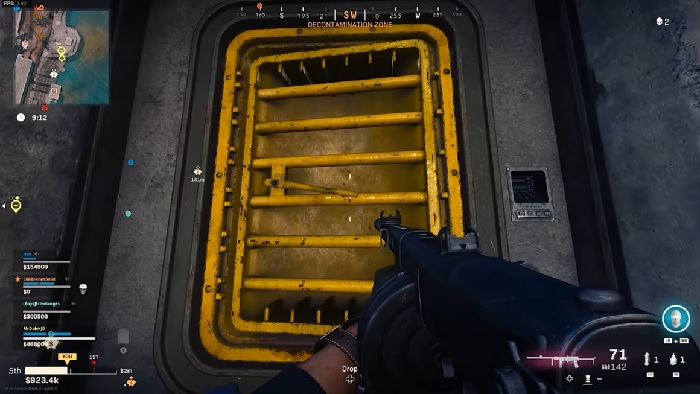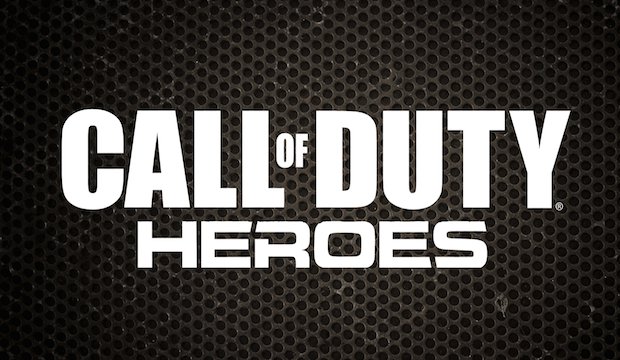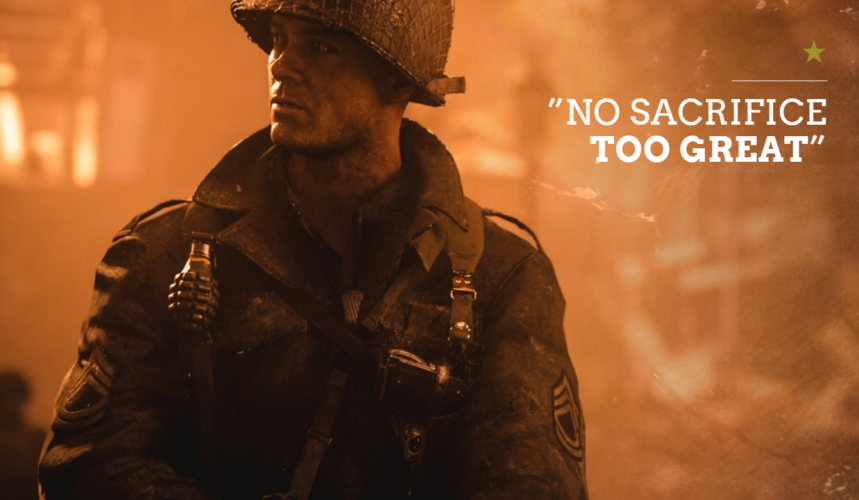Features
Why Call of Duty’s New 3-Year Cycle Is Important

 Since 2006, a new Call of Duty game has come out every fall, like clockwork. Arguably the most high-profile annualized franchise still in existence, Call of Duty has reinvented the financial model of video game releases. It brought the Madden formula to shooters, delivering a new experience every year for eagerly waiting fans. For some players, this annualized approach to the FPS juggernaut is perfect, and they get hyped and excitedly anticipate each new installment, year after year. Everyone can relate to wanting the next story or experience after they finish the first, and annualized games drastically reduce the often torturous wait. When I am heavily invested in a series, the span between sequels can be incredibly frustrating, but a wait of only a year is much more manageable than, say, a half-decade drought.
Since 2006, a new Call of Duty game has come out every fall, like clockwork. Arguably the most high-profile annualized franchise still in existence, Call of Duty has reinvented the financial model of video game releases. It brought the Madden formula to shooters, delivering a new experience every year for eagerly waiting fans. For some players, this annualized approach to the FPS juggernaut is perfect, and they get hyped and excitedly anticipate each new installment, year after year. Everyone can relate to wanting the next story or experience after they finish the first, and annualized games drastically reduce the often torturous wait. When I am heavily invested in a series, the span between sequels can be incredibly frustrating, but a wait of only a year is much more manageable than, say, a half-decade drought.
But the problem of annualized sequels, we all know, is that it can dramatically reduce the quality of an experience. As we can see with the Madden, NCAA Football, and FIFA games, innovation and risk-taking are rare when a studio is given only one year to produce a game. EA sports games have, in my opinion, the most lackluster animation and art in any high-profile, successful game. Crowds look like cardboard cutouts, players still have dead looking eyes, and movements are still jerky and unnatural. Compared to something like Assassin’s Creed or Uncharted, the graphics have improved very little from the beginning of the Xbox 360/PS3 generation. And, although such independent AI that exists in sports games is resource-intensive, there is no reason why the games should not have progressed more as the developers learned how to use the hardware better.
But EA Tiburon only has one year to put out Madden games. And in that year, there is very, very little that they can do to ever drastically increase the quality of their game. They need a year or two off from releases so that they might fully begin from scratch, to make a football game that looks and feels as lifelike as the immensely powerful PS4 and Xbox One hardware can now support.
Activision attempted to mitigate this problem by cycling Call of Duty between two entirely separate studios, Infinity Ward and Treyarch. And for a while, this worked. Vince Zampella (now of Respawn and working on Titanfall) and Jason West completely revolutionized the first person shooter with Call of Duty 4: Modern Warfare. But soon, the teams fell into a cycle of evolution, and not revolution. Hampered by only two years to develop and immense pressure from their publisher, the two studios could do little to ever truly innovate on the familiar, albeit successful, Modern Warfare formula.
But little traces of potential innovation exist in the Call of Duty games, more so than in the Madden or FIFA games. Treyarch, especially, shows promise in Black Ops and Black Ops II. The first introduced a completely ridiculous but fun and entertaining story about deep-cover operations during the 70s, during which fever dreams and/or recollections showed the player doing anything from shooting Castro’s doppelganger to assassinating JFK. “The numbers, Mason! What do they mean?” This line became well known because of the over-the-top conspiracy plot of Black Ops. In Black Ops II, Treyarch tried something shockingly daring for such a high-profile game like Call of Duty. They introduced player agency into the campaign. They allowed player choices to actually affect the outcome of the game, something that made the plot, while somewhat lackluster, stand out and engage the audience. Treyarch also introduced weapon loadouts in the campaign, a deeper level of character customization during multiplayer, and a now-famous player action, the “dolphin dive”.
And yet, this innovation seems to have been largely ignored by Activision. Last year’s game, Ghosts, did away with all of this and reverted back to the well-worn path of the Modern Warfare games. Infinity Ward attempted to impart a little more emotion into the storyline, and to make it a much more personal plot, but it was largely a reiteration of past Infinity Ward games. The players and critics noticed this, and at the time of this writing, Call of Duty: Ghosts is the lowest scoring CoD game on Metacritic and it has sold less than Black Ops II.
But what if the teams at Activision were given a little more time to develop their Call of Duty games? As the flashes of innovation hint at, this could be a rebirth for the franchise. This could allow Treyarch to make a fully branching narrative that takes into account player choice in a much more subtle and effective way, perhaps like Mass Effect. This could enable Infinity Ward to produce a truly resonant campaign with an emotional impact that approaches something like The Last of Us. There is such a wealth of potential in the Call of Duty franchise, and if the developers are given enough time to take risks, I believe that the quality of the CoD games would skyrocket.
And now, they have more time. With the inclusion of a third studio, Sledgehammer Games, in the cycle, each developer now has three years to work on their game. This could be the breath of fresh air that the franchise so desperately needs. This could be the turning point where each team can reinvent themselves and their game, and make something truly outstanding. It is still too early to tell for CoD, but prior games have shown that a longer development time generally leads to higher quality.
Finally, the gaming world has acknowledgment from one of the biggest publishers that enough development time is important. This could be a response to Take-Two’s announcement that Rockstar’s Grand Theft Auto V has sold over 32 million copies since it was released, demolishing sales of Call of Duty: Ghosts. Rockstar was given about five years to work on the game, as opposed to the two for Call of Duty. Just as sales of Call of Duty are falling, Activion’s rival releases a blockbuster game of high quality to immense and insatiable demand. Although an annualized release cycle can never incite that kind of demand, it appears that Activision did realize that quality is vitally important in keeping gamer interest.
This is a huge moment, then, in the video game industry. Perhaps this move could motivate other publishers to allow their developers an increased amount of time, too. Maybe EA Tiburon will finally be given a little room to breathe and develop a much improved and innovated sports game. Hopefully Ubisoft will more efficiently use their seemingly unlimited supply of developers and allow Assassin’s Creed to have a three-year development time, not just two-year as it is now.
Publishers, if they are dead-set on holding onto annualized cycles, need to allow their developers time to work. Too many franchises are at risk of being driven into the ground. Game series need innovation to survive, and innovation only comes with enough time. It is imperative, therefore, that developers are given a substantial development period. Iterative sequels are not enough anymore. We need revolution, and a departure from evolution, in game development.
Featured
Horse Racing Games For iOS

Horse racing is a globally spread sport with billions of fans worldwide. The thrills of the races and the excitement of the betting make horse racing quite popular among adrenaline rush seekers.
However, unlike other sports like football or basketball that you can actually try in your backyard, becoming a racehorse rider is out of reach for most people. But all hope for our fellow race lovers is not lost and the gaming world comes to the rescue.
We are talking about horse racing simulation games where you can pick or breed your own horse, participate in online racing tournaments, earn prestige, take care of your horse, and much more.
Horse racing video games are perfect when it comes to getting the bigger picture of the sport and familiarizing yourself with other aspects apart from racing, like stable management, breeding, and finance management.
On top of that, horse racing video games can help you understand how the sport works, which may help you with the next bet you make on TwinSpires.
Fortunately, there are plenty of horse racing games for iOS, and in today’s article, we will highlight some of the best that you should try.
Rival Stars Horse Racing
This is a game made by a legendary horse race video game developer called PikPok and it is without a doubt one of the best horse racing games available for iOS right now.
The graphics look incredible for a mobile game. They are quite realistic, and the horse movement and the design of the tracks also give you the feel that you are participating in a real-world race.
Rival Stars Horse Racing has quite a fast pace, where you can complete some quests and upgrade your stable, but the focus is on the races, as it should be.
When we talk about the racing part of the game, every racetrack that you unlock offers something new. You get to race at different lengths and surfaces. But let’s focus on the important part, race mechanics.
You can steer the horse, brake, and activate their sprint ability. The horse’s performance is based on multiple factors such as ground consistency, position, race length, previous races, and much more.
Rival Stars Horse Racing also has a quite good breeding, training, and managing system. On top of that, there are many different horse coat colors and breeds. Unlike other games like Zelda where you can get a gold horse, Rival Stars Horse Racing focuses on realism. All of the horses have natural coat colors and traits.
You get to collect or breed horses, transform foals to feed, and upgrade facilities to unlock more options to progress.
The only thing that is missing from the game is the audience on the races since the race courses feel a bit empty with nobody around.
Horse Racing Manager 2024
This is a game that has a rather different approach than Rival Stars Horse Racing. It is focused more on the managing part of horse racing rather than on the actual gameplay and racing. You are in control of your business operation and your goal is to succeed in the world of horse racing and earn money.
You don’t have an impact on the races, and you cannot control your horse. The races are simulated, and the outcome depends on your horse’s stats and abilities.
That’s why horse training, and breeding a champion horse play a really important role in the game.
The best thing about Horse Racing Manager 2024 is the ability to race online. There are live PVP races that occur every 5 minutes and everyone can participate in them.
This is the perfect game if you want to learn what’s happening behind the curtains of horse racing as a sport. You are in control of your breeding rights that you can sell, as well as the age and career path of your horse.
It is an interesting game, especially for those who are not afraid of data and analysis.
iHorse Racing
This is a similar game to Rival Stars Horse Racing but with worse graphics, and fewer options. This game has multiple features like horse training, stable management, horse auction, race entries, CLU-jockey hiring system, and world jockey ranking, and you can connect your Facebook profile to invite friends.
To be honest, the graphics and gameplay of the game are fun and engaging, but I’d still go for Rival Stars Horse Racing, especially if you like a more realistic horse racing game.
Pocket Stables
Let’s drop down all the realism and focus on some retro 2D gameplay. For all retro game lovers who have a passion for horse racing, Pocket Stables is just the perfect game. At first glance, this game might look simple, but it actually has many features that make it even more fun.
For starters, you can build training facilities where you can increase your horse’s stats. Additionally, not all horses are the same and your goal should be to find a horse with the right balance of speed, stamina, and intensity.
As you win races, you’ll receive prizes, that can be used to upgrade your stable and give you better ways to breed a faster horse.
It’s fun, casual, and quite cute. Plus, you get to build your horse racing community and hire people that will take care of your stable.
Features
Exploring k2.vox365: Revolutionizing Digital Communication and Collaboration

In today’s fast-paced digital world, businesses and individuals alike are constantly looking for efficient ways to communicate and collaborate. Enter k2.vox365, a powerful platform designed to streamline communication, enhance collaboration, and boost productivity. With its comprehensive suite of tools, k2.vox365 is rapidly becoming a preferred solution for businesses, educational institutions, and remote teams looking to stay connected and organized.
What is k2.vox365?

At its core, k2.vox365 is a unified communication and collaboration platform that brings together messaging, video calls, and project management into one seamless experience. Unlike traditional tools that require switching between different apps for emails, chat, and file sharing, k2.vox365 integrates all these features into a single, easy-to-use platform. This all-in-one solution reduces complexity and makes communication more efficient for teams of all sizes. Since its inception, k2.vox365 has gained traction for its robust functionality and user-friendly interface, positioning it as a strong competitor in the digital communication space.
Core Features of k2.vox365
A. Unified Messaging
One of the standout features of k2.vox365 is its unified messaging capability. The platform allows users to manage all forms of communication — whether it’s emails, instant messages, or video calls — from one place. Users can easily transition between messaging modes without the hassle of switching between apps. This is especially beneficial for teams who need real-time communication but also rely on email for formal exchanges.
B. Collaboration Tools
In addition to communication, k2.vox365 offers a suite of collaboration tools that help teams work together effectively. Whether it’s real-time document editing, file sharing, or managing tasks and projects, k2.vox365 enables seamless collaboration across departments. Teams can work on the same document simultaneously, leaving comments, making changes, and tracking progress all in one place, reducing the need for endless email chains or disjointed software solutions.
C. Cloud-based Accessibility
With cloud-based accessibility, k2.vox365 ensures that users can access their work from any device, at any time. Files, messages, and projects are all stored securely in the cloud, allowing for easy access whether you’re in the office or working remotely. This also means that data is continuously backed up, minimizing the risk of losing important information due to technical failures.
How k2.vox365 Enhances Business Productivity
One of the biggest benefits of k2.vox365 is its ability to boost business productivity. By consolidating communication, collaboration, and project management into one platform, teams can work more efficiently. The unified approach reduces downtime spent switching between apps, looking for files, or chasing down project updates. This streamlined workflow allows employees to focus on what truly matters: delivering results. Furthermore, the real-time collaboration tools improve team coordination, ensuring everyone stays on the same page.
Security and Data Protection in k2.vox365
In an age where data breaches and cyber threats are rampant, k2.vox365 prioritizes security and data protection. The platform uses end-to-end encryption to ensure that all communication, whether it’s messaging, video calls, or file sharing, remains secure. Additionally, k2.vox365 complies with important data privacy regulations, such as GDPR, offering peace of mind to businesses concerned about safeguarding sensitive information. The platform also includes advanced measures to protect against phishing attacks and malware, ensuring a secure communication environment for all users.
Industry Applications of k2.vox365
k2.vox365 is not just for businesses. Its versatility makes it an excellent choice for a variety of industries:
A. Corporate Environments
In corporate settings, k2.vox365 is used to streamline internal communication and project management. Its integrated tools allow departments to work more efficiently, keeping track of tasks, deadlines, and project progress. The platform’s unified messaging system also makes it easy for team members to stay in constant communication, regardless of their location.
B. Educational Institutions
For educational institutions, k2.vox365 provides a seamless way to support virtual learning. Teachers and students can communicate through video calls, share files, and collaborate on assignments in real time. The platform’s task management tools help students stay organized, ensuring that assignments are completed on time.
C. Remote Work
With remote work becoming the norm, k2.vox365 plays a crucial role in enabling teams to stay connected no matter where they are. Its cloud-based services ensure that employees can access files and communicate with colleagues from any device, making it a perfect tool for global teams and freelancers who need to collaborate across time zones.
Comparing k2.vox365 with Competitors
When compared to other popular platforms like Microsoft Teams, Slack, or Zoom, k2.vox365 holds its own. While Microsoft Teams and Slack are well-known for their chat-based collaboration, k2.vox365 excels with its broader set of features, including unified messaging, integrated project management, and cloud accessibility. Zoom, a leader in video conferencing, offers a more limited scope compared to k2.vox365’s full suite of tools. The strength of k2.vox365 lies in its ability to combine multiple communication channels into one platform, giving it an edge over these single-function competitors.
User Testimonials and Case Studies
Many businesses have seen tangible benefits after adopting k2.vox365. For instance, XYZ Corporation, a mid-sized tech company, reported a 20% increase in team productivity after switching to the platform. The real-time collaboration tools helped employees reduce delays and stay better aligned on projects. Similarly, ABC University found that k2.vox365 significantly improved communication between students and faculty, especially during the shift to remote learning.
Pricing and Subscription Plans
k2.vox365 offers flexible pricing tailored to different business needs. For small businesses, there’s a basic plan that includes essential features like messaging and file sharing. Larger enterprises can opt for more advanced plans, which offer additional features like enhanced security, advanced project management tools, and increased cloud storage. There are also customized plans for educational institutions, allowing them to access the platform’s full suite at a discounted rate.
Future Prospects for k2.vox365
The future looks bright for k2.vox365. The platform’s developers are continuously working on new features, including AI-driven productivity tools and more advanced security protocols. As businesses continue to shift towards digital solutions, k2.vox365 is poised to become a leader in the communication and collaboration space. With plans to expand its global presence, the platform is set to make a significant impact in the market in the coming years.
Conclusion
In conclusion, k2.vox365 is an innovative platform that provides a comprehensive solution for communication and collaboration. With its unified messaging system, real-time collaboration tools, and cloud-based accessibility, it is designed to help businesses, educational institutions, and remote teams stay connected and productive. As digital communication continues to evolve, k2.vox365 is well-positioned to lead the way, offering the tools and features necessary for success in today’s fast-paced world.
Casual
Creative Ideas for Best Technology Instagram Post 2024

Are you facing difficulty in engaging your audience with tech posts on Instagram? As social media platforms have transformed into virtual marketplaces, brands recognize the need to showcase expertise through engaging content.
Platforms like Instagram empower connecting with worldwide audiences through captivating visual stories. But, it is quite a daunting task to work and many move ahead to buy Instagram followers as well.
Contemporary consumers scarcely have time for promotion lacking substance. Hence, creatives demand integrating education with entertainment for intrinsically motivating connections. This is why in this post, we discuss top ideas for your tech-posts on Instagram. Read on.
Top Instagram Post Ideas for Technology in 2024
There are many creative and unique ways to catch attention for your technology posts on Instagram. Below we discuss some of the most popular ones that can certainly get all eyes on you.
I. Using Tech Products as Props
Showcasing the ergonomic elegance of newest smartphones through lifestyle photos depicting them harmonizing with modern interiors signifies how technologies enhance lives unobtrusively.
Flat lays carefully arranging phones alongside complementary gadgets like smartwatches and earbuds exhibits compatible accessories apt for varied tasks. Close-up shots exploring interesting details on laptops or cameras from unique angles pique curiosity towards innovative engineering.
Illustrations envisioning people multitasking efficiently through integration of different devices tells stories audiences relate to. Including props within realistic settings displays practical applications beyond technical specifications.
II. Behind the Scenes Photos of Tech
Sneak peeks hinting at cutting-edge features of anticipated device launches grant exclusivity while cultivating hype. Well-lit workplace photographs portray engineers concentrating on prototyping components and inspire admiration.
Snapshots capturing programming teams collaborating wirelessly on interactive whiteboards through mobile apps demonstrate streamlined productivity. Infographics adorning clean designs simplify explaining complex algorithms behind facial recognition or data analytics in accessible language.
Short videos taking viewers inside futuristic factories reveal meticulous manufacturing processes with a sense of intimacy.
III. Infusing Tech with Humor
Lighthearted memes humorously portraying predictable reactions to everyday tech troubles provide comic relief to stressful scenarios. Relatable situations humorously presented divert from serious sales pitches.
Personified tech objects in comical misadventures amuse audiences through humanizing technology. Satires skewering society’s obsession with smartphones in a tongue-in-cheek manner encourages shares to spread smiles. When infused judiciously, humor aids connection by sparking emotions beyond sales.
IV. Showcasing the Human Side of Tech
Introducing changemakers through portraits celebrating their groundbreaking work nurtures admiration. Profiles highlighting individuals transforming lives through accessible education technologies promote empowerment.
Environmental initiatives leveraging automation to offset carbon footprints brings a humanistic face to sustainability efforts. Impactful community projects excelling through connectivity showcase technology uplifting society versus solely profit motives.
Sensitively showcasing stories of overcoming challenges strengthens bonds between brands and audiences.
V. Visual Presentations of Tech Topics
Creative arrangements of flat lays showcasing virtual or mixed reality controllers provides an experiential feel of the immersive tech itself. Sequential photos arranged like puzzle pieces or in grids present complex technical concepts through visual storytelling.
Infographics leveraging minimalist aesthetics simplify explaining blockchain or cloud computing. Illustrations personifying IoT appliances in a “day in life” routine brings relatability to innovations perceived as complex. Data visualizations comparing tech trends succinctly impart industry insights.
VI. Leveraging Trending Tech Themes
Imaginative demonstrations of artificial intelligence streamlining lives pique intrigue towards groundbreaking research. Showcasing developments in robotics, VR or internet of things solving pressing issues cultivates social purpose beyond sales.
Highlighting startups leveraging cutting-edge innovations attracts investors and talent. Curated reels condensing key takeaways from tech summits grant exclusive access. Tactical hashtags around concepts ranging from 5G to cybersecurity optimize discovery of relevant audiences worldwide.
Unique Ways To Boost Engagement
With competition so fierce, it becomes difficult to keep your audience engaged with your post. Below we discuss some essential tips that can make things easy for you. Take a look:
● Researching Optimized Hashtags
Analyzing hashtag clusters witnessing frequent usages around niche conversations aids discovering appropriate tags aligning with targeted audiences. Careful hashtagging aids discoverability and spreads messages to receptive crowds naturally.
● Optimizing Images For Social Formats
Adjusting photos to square dimensions suitable for Instagram feeds and story formats preserves visual quality and context. Proper sizing and cropping focuses viewer attention on essential elements.
● Scheduling Around Peak Engagement Timings
Identifying timing patterns of highest follower activities through analytics aids posting when most eyeballs will likely notice new updates. Repurposing top performing content as story highlights retains visibility.
● Reviewing Engagement And Follower Insights
Regularly evaluating metrics like likes, comments, saves and follower growth rates aids comprehending reception and refining strategies. Tracking identified hashtag or location based communities’ interests guides customized content.
● Partnering With Key Influencers
Reaching wider audiences through cross-promotional shoutouts with popular domain figures expands networks. Collaborations establishing brand authority through third party endorsements bolster credibility.
Final Thoughts
In summary, effectively leveraging visual creativity fueled by data-driven decisions establishes technology companies, alongside support from a dedicated social media growth agency like Thunderclap.it, as thought leaders amid competition on platforms like Instagram.
Consistency, authenticity, and nurturing communities through meaningful interactions are crucial for driving organic visibility and achieving superior returns on social media. While maintaining technical excellence is essential, emotionally connecting with audiences through social missions and humor helps build a loyal following and fosters trust in this experience-driven world.
-

 Guides5 years ago
Guides5 years ago6 Proven Ways to Get more Instagram Likes on your Business Account
-

 Mainstream10 years ago
Mainstream10 years agoBioWare: Mass Effect 4 to Benefit From Dropping Last-Gen, Will Not Share Template With Dragon Age: Inquisition
-

 Mainstream6 years ago
Mainstream6 years agoHow to Buy Property & Safe Houses in GTA 5 (Grand Theft Auto 5)
-

 Casual2 years ago
Casual2 years ago8 Ways to Fix Over-Extrusion and Under-Extrusion in 3D Printing
-

 Mainstream12 years ago
Mainstream12 years agoGuild Wars 2: The eSports Dream and the sPvP Tragedy
-

 Guides10 months ago
Guides10 months agoFree Fire vs PUBG: Comparing Graphics, Gameplay, and More
-

 iOS Games2 years ago
iOS Games2 years agoThe Best Basketball Games for IOS
-

 Gaming News1 year ago
Gaming News1 year agoSwiping, Tapping, and Tilting: How Mobile Games Are Played Today






